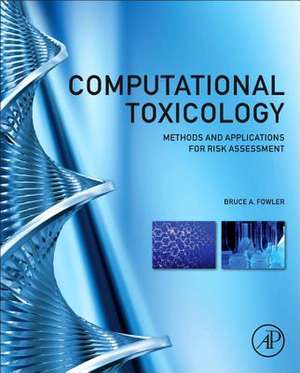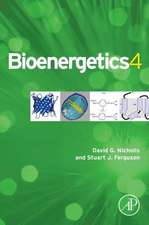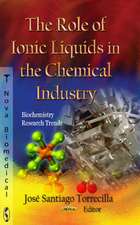Computational Toxicology: Methods and Applications for Risk Assessment
Editat de Bruce A. Fowleren Limba Engleză Hardback – 31 iul 2013
- Authored by leading international researchers engaged in cutting-edge applications of computational methods for translating complex toxicological data sets into useful risk assessment information
- Incorporates real-world examples of how computational toxicological methods have been applied to advance the science of risk assessment
- Provides the framework necessary for new technologies and fosters common vocabularies and principles upon which the effects of new chemical entities should be compared
Preț: 1224.09 lei
Preț vechi: 1288.52 lei
-5% Nou
Puncte Express: 1836
Preț estimativ în valută:
234.22€ • 245.21$ • 193.81£
234.22€ • 245.21$ • 193.81£
Carte tipărită la comandă
Livrare economică 07-21 aprilie
Preluare comenzi: 021 569.72.76
Specificații
ISBN-13: 9780123964618
ISBN-10: 012396461X
Pagini: 274
Ilustrații: 50 illustrations
Dimensiuni: 191 x 235 x 18 mm
Greutate: 0.69 kg
Editura: ELSEVIER SCIENCE
ISBN-10: 012396461X
Pagini: 274
Ilustrații: 50 illustrations
Dimensiuni: 191 x 235 x 18 mm
Greutate: 0.69 kg
Editura: ELSEVIER SCIENCE
Public țintă
Toxicologists, pharmacologists, pharmaceutical scientists and biochemists in academic, regulatory and industry (pharmaceutical, chemical, environmental and biotechnology) settings.Cuprins
FOREWORD
1. INTRODUCTION
2. PBPK, QSAR and TOXICITY PATHWAYS: CHEMICAL SCREENING AND PRIORITZATION TOOLS
3. COMPUTATIONAL RISK ASSESSMENT OF UNTESTED HAZARDOUS CHEMICAL AGENTS RELEASTED IN THE WATER ENVIRONMENT
4. RISK ASSESSMENT OF CHEMICAL MIXTURES
5. MODELING SENSITIVE SUB-POPULATIONS FOR RISK ASSESSMENT
6. COMPUTATIONAL METHODS FOR TOXICOGENOMIC ANALYSES FOR RISK ASSESSMENT
7. INTEGRATED SYSTEMS BIOLOGY APPROACHES TO PREDICTING DRUG-INDUCED LIVER TOXICITY
8. COMPUTATIONAL TRANSLATION AND INTEGRATION OF TEST DATA TO MEET RISK ASSESSEMENT GOALS
9. COMPUTATIONAL TRANSLATION OF DATA FROM NON-MAMMALIAN SPECIES TO MEET REACH INFORMATIONAL STRATEGIES
10. DEVLOPMENT OF IN SILICO TISSUE MODELS FOR RISK ASSESSMENT
11. EXAMPLES OF SIMULATIONS WITH A NEWLY DEVELOPED GENERIC PBTK –MODEL FOR INCORPORATING HUMAN BIOMONITORING DATA TO MEET REACH GUIDELINES
12. USE OF PUBLIC DATA SETS for RISK ASSESSMENT
13. COMPUTATIONAL TOXICOLOGY AND APPLICATIONS FOR RISK ASSESSMENTS OF PHARMACEUTICALS
14. DECISION FOREST: A NOVEL PATTERN RECOGNITION METHOD FOR IN SILICO RISK ASSESSMENT
15. TRANSLATION OF COMPUTATIONAL MODEL RESULTS
16. FUTURE RESEARCH NEEDS
1. INTRODUCTION
2. PBPK, QSAR and TOXICITY PATHWAYS: CHEMICAL SCREENING AND PRIORITZATION TOOLS
3. COMPUTATIONAL RISK ASSESSMENT OF UNTESTED HAZARDOUS CHEMICAL AGENTS RELEASTED IN THE WATER ENVIRONMENT
4. RISK ASSESSMENT OF CHEMICAL MIXTURES
5. MODELING SENSITIVE SUB-POPULATIONS FOR RISK ASSESSMENT
6. COMPUTATIONAL METHODS FOR TOXICOGENOMIC ANALYSES FOR RISK ASSESSMENT
7. INTEGRATED SYSTEMS BIOLOGY APPROACHES TO PREDICTING DRUG-INDUCED LIVER TOXICITY
8. COMPUTATIONAL TRANSLATION AND INTEGRATION OF TEST DATA TO MEET RISK ASSESSEMENT GOALS
9. COMPUTATIONAL TRANSLATION OF DATA FROM NON-MAMMALIAN SPECIES TO MEET REACH INFORMATIONAL STRATEGIES
10. DEVLOPMENT OF IN SILICO TISSUE MODELS FOR RISK ASSESSMENT
11. EXAMPLES OF SIMULATIONS WITH A NEWLY DEVELOPED GENERIC PBTK –MODEL FOR INCORPORATING HUMAN BIOMONITORING DATA TO MEET REACH GUIDELINES
12. USE OF PUBLIC DATA SETS for RISK ASSESSMENT
13. COMPUTATIONAL TOXICOLOGY AND APPLICATIONS FOR RISK ASSESSMENTS OF PHARMACEUTICALS
14. DECISION FOREST: A NOVEL PATTERN RECOGNITION METHOD FOR IN SILICO RISK ASSESSMENT
15. TRANSLATION OF COMPUTATIONAL MODEL RESULTS
16. FUTURE RESEARCH NEEDS
Recenzii
"Computational Toxicology is big and it is clever!...The book is easy to read with a wealth of easy to follow figures and an abundance of references…it offers readers a good perspective of what is currently achievable with computational toxicology and what is on the horizon. This book certainly has a place in most libraries." --btsNews, June 2014
"This collection reviews the state of the science in computer models for assessing human risk from chemical exposure and identifies specific applications that have enhanced the response to a defined risk assessment challenge…Practical translation of computational methods for risk assessment, computational translation and integration of test data to meet risk assessment goals, and computational translation of data from nonmammalian species… are also discussed." --ProtoView.com, February 2014
"ICF International experts authored this essential reference on the translation of computational toxicology data into information that can be used for more informed risk-assessment decision making. The book provides an updated summary of the state-of-the-art science in the field of computational toxicology methods and offers examples of applications to risk assessment." --ICF International online, 2013
"This collection reviews the state of the science in computer models for assessing human risk from chemical exposure and identifies specific applications that have enhanced the response to a defined risk assessment challenge. The 11 contributions describe physiologically based pharmacokinetic…models for simulating dose metrics in sensitive subpopulations, a dynamic systems model of rat liver homeostasis, the quantitative structure-activity relationship… tool for simulating necessary endpoints, and omics biomarker discovery." --Reference & Research Book News, December 2013
"The new book on Computational Toxicology edited by Dr. Bruce Fowler is a timely publication. It presents, in a well-organized and concise manner, a collection of excellent chapters on the methods and practical applications of computational toxicology. This is a very useful reference volume, but can be read cover-to-cover by those of us who want a general and current understanding of computational toxicology." --James C. Lamb, IV, Ph.D, DABT, ATS
Principal Scientists and Center Director Center for Toxicology and Mechanistic Biology Exponent
"This collection reviews the state of the science in computer models for assessing human risk from chemical exposure and identifies specific applications that have enhanced the response to a defined risk assessment challenge…Practical translation of computational methods for risk assessment, computational translation and integration of test data to meet risk assessment goals, and computational translation of data from nonmammalian species… are also discussed." --ProtoView.com, February 2014
"ICF International experts authored this essential reference on the translation of computational toxicology data into information that can be used for more informed risk-assessment decision making. The book provides an updated summary of the state-of-the-art science in the field of computational toxicology methods and offers examples of applications to risk assessment." --ICF International online, 2013
"This collection reviews the state of the science in computer models for assessing human risk from chemical exposure and identifies specific applications that have enhanced the response to a defined risk assessment challenge. The 11 contributions describe physiologically based pharmacokinetic…models for simulating dose metrics in sensitive subpopulations, a dynamic systems model of rat liver homeostasis, the quantitative structure-activity relationship… tool for simulating necessary endpoints, and omics biomarker discovery." --Reference & Research Book News, December 2013
"The new book on Computational Toxicology edited by Dr. Bruce Fowler is a timely publication. It presents, in a well-organized and concise manner, a collection of excellent chapters on the methods and practical applications of computational toxicology. This is a very useful reference volume, but can be read cover-to-cover by those of us who want a general and current understanding of computational toxicology." --James C. Lamb, IV, Ph.D, DABT, ATS
Principal Scientists and Center Director Center for Toxicology and Mechanistic Biology Exponent








